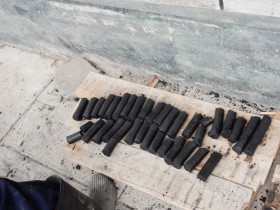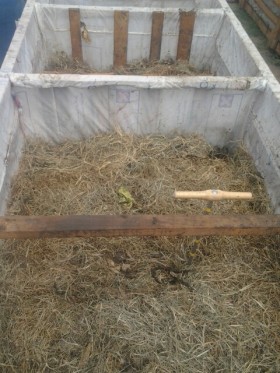Due to our new website, community posts are copied from the old to the new one. Therefore, we would like to emphasize that this post is written by Reinilde Eppinga:
(Originally posted 23 days ago)
The Nakuru County Sanitation Programme, together with SCODE Ltd. and Egerton University, has started developing Bio-Fuels: Faecal matter was dried, carbonised and transformed into briquettes at the NAWASSCO Treatment Plant in Nakuru. Research into bio-fertiliser has started with the first composting boxes filled with market waste and faecal matter.




Comment by Lawrence Kimaru:
One of the major benefits of human excreta is its fertilizer and soil conditioner potential. Each day, humans excrete approximately 30g of carbon (equivalent to 90g of organic matter), 10-12g of nitrogen, 2g of phosphorus and 3g of potassium. Most of the organic matter is contained in the faeces, while 70-80% of the nitrogen and potassium are contained in urine. Phosphorus is equally distributed between urine and faeces. Following the principles of sustainable development,nutrients in sludge should be used in plant production, instead of ending up in wastewater treatment plants. If the nutrients in the faeces of one person were used for grain cultivation, it would enable the production of the annual amount of grain consumed by one person (250 kg).
Update VIA-Water project: From Pit to Product on-going research and request for input from VIA-Water community on use of alum in production of faecal matter products


The VIA Water-project: From Pit to Product, further developed the biomass-fuels (carbonised briquettes and non-carbonised fuel-pellets) as well as bio-fertilisers (vermi-compost, compost, biochar and dried sludge) for field and horticultural crops as well as a soil amendment. Biomass-fuel product research as well as field trials for bio-fertiliser are on-going and pre-liminary results expected soon.
Below a photo impression of the on-goig research in partnership with Egerton University, SCODE Ltd and VEI and SNV, partners of the Nakuru County Sanitation Programme.
A question for the experts in this forum: Does any of you have experience with the use of alum (chemical that can be used to promote coagulation) when creating a product like fertiliser or fuel from sludge? Scientific articles provide some guidance, but anyone in the house with in-sight?
Does any of you have experience with the use of alum (chemical that can be used to promote coagulation) when creating a product like fertiliser or fuel from sludge? Scientific articles provide some guidance, but anyone in the house with in-sight?